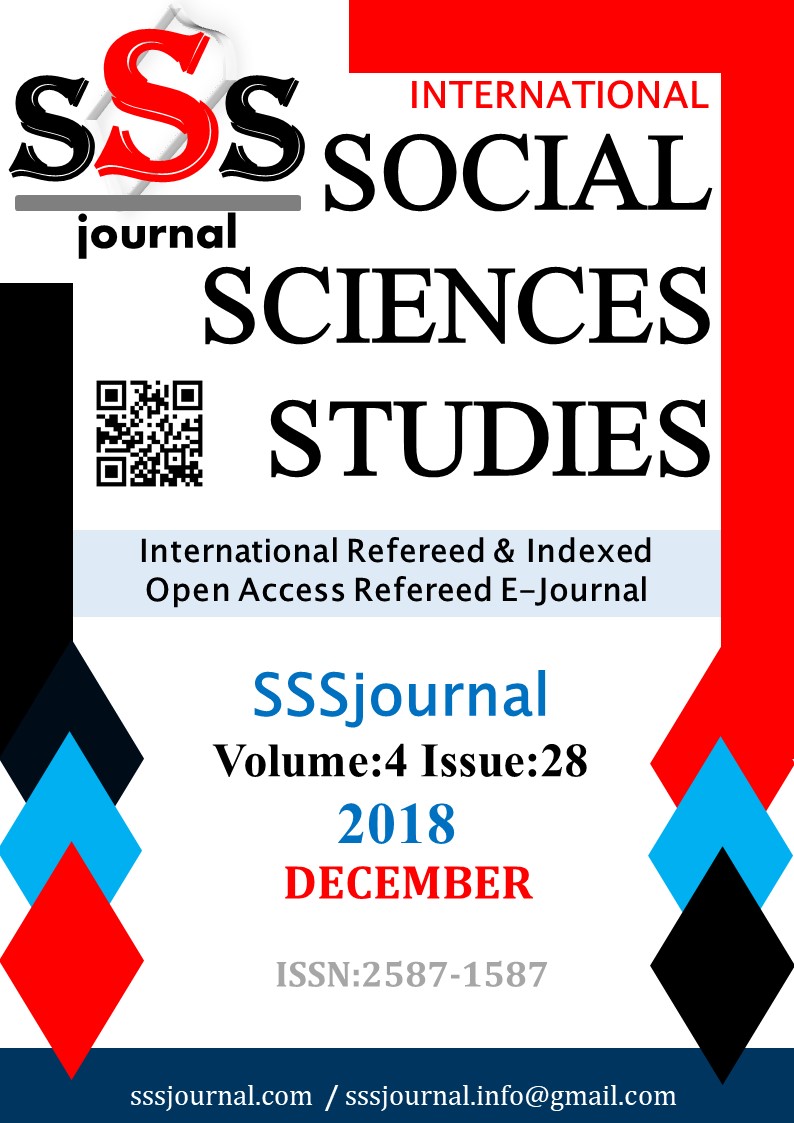TÜRKİYE’DE TEKSTİL VE HAZIR GİYİM SEKTÖRÜNÜN ULUSLARARASI REKABET GÜCÜ: AKÜ ENDEKSİ İLE KARŞILAŞTIRMALI BİR ANALİZ
Author :
Abstract
Günümüzde ülkelerin dış ekonomik ilişkilerinde üstünlüğünün temel belirleyicilerinden biri uluslararası rekabet gücüdür. Küreselleşmenin ivme kazanmasının bir sonucu olarak ülkeler arasında dış ticaret ilişkilerinin yoğunlaşması rekabetin giderek artmasına neden olmaktadır. Özellikle Türkiye ekonomisi gibi yüksek cari açık veren gelişmekte olan ülkelerin makro ekonomik programlarında, rekabet gücünün arttırılması temel hedef olarak belirlenmektedir. Bu noktada Türkiye’de ‘iktisadi büyümenin motoru’ olarak ifade edilen imalat sanayi sektörlerinin dış ekonomik performansı ve dolayısıyla rekabet gücü büyük önem arz etmektedir. Gerek GSYİH içinde aldığı yüksek pay gerekse ihracattaki olumlu performansı nedeniyle Türk tekstil ve hazır giyim sektörünün uluslararası rekabet gücü diğer sektörlere kıyasla daha stratejik bir konumdadır. Literatürde uluslararası rekabet gücünün ölçümüne ilişkin çok sayıda yöntem olmasına rağmen en yaygını ve en sık kullanılanı Balassa’nın geliştirdiği Açıklanmış Karşılaştırmalı Üstünlükler (AKÜ) endeksidir. AKÜ endeksi, ülkenin herhangi bir mal veya sektör ihracatının toplam ihracattaki payı ile aynı mal veya sektörün dünya ihracatının toplam dünya ihracatındaki payı kıyaslanarak hesaplanır. Bu anlamda AKÜ endeksi sayesinde bir ülkenin herhangi bir mal veya sektörde, dış dünyaya karşı karşılaştırmalı üstünlüğe sahip olup olmadığı rahatlıkla saptanır. Bu çalışmanın amacı, 1996-2015 döneminde Türk tekstil ve hazır giyim sektörünün uluslararası rekabet gücünü sektörün en yüksek 10 ihracatçı ülkesi ile karşılaştırarak analiz etmektir. Bu doğrultuda çalışmada, uluslararası rekabet gücü ölçümünde Balassa’nın Açıklanmış Karşılaştırmalı Üstünlükler (AKÜ) endeksi kullanılmıştır.
Keywords
Abstract
At the present time, one of the main determinant of countries’ superiority in foreign economic relations is international competitiveness. As a result of the acceleration of globalization, intensification of foreign trade relations among countries causes competition to gradually increase. Especially in the macro economic programs of developing countries, which give a high current account deficit such as the Turkish economy, increasing competitiveness is determined as the main target. At this point, the foreign economic performance of manufacturing industry sectors, which are referred to as "engine of economic growth" in Turkey, and hence the competitiveness, are of great importance. Due to its high share in GDP and its positive performance in exports, the international competitiveness of Turkish textile and apparel sector is more strategic in comparison to other sectors. In spite of there are many methods for measurement of international competitiveness in the literature, its the most widespread and the most frequent used is Revealed Comparative Advantages (RCA) index developed by Balassa. The RCA index is calculated by comparing the share of the country's any goods or sector export in total exports and the share of the same goods or sector’s world exports in total world exports. In this sense, by means of the RCA index, it can be easily determined whether a country has comparative advantage against the outside world in any goods or sectors. The aim of this study is to analyze the international competitiveness of Turkish textile and apparel sector in the period of 1996-2015 by comparing with top 10 exporters countries of sector. In this study, Balassa's RCA index was used to measure international competitiveness.
Keywords
- Aktan, C. C., & Vural, İ. (2004). Rekabet Gücü ve Rekabet Stratejileri. Ankara, TİSK Yayını.
- Aktan, C. C., & Vural, İ. (2004). Rekabet Gücü ve Rekabet Stratejileri. Ankara, TİSK Yayını.Balassa, B. (1965). "Trade Liberalization and Revealed Comparative Advantage". The Manchester School of Economic and Social Studies, 33: 92-123.
- Bashimov, G. (2017). "Türk Tekstil ve Hazır Giyim Sektörünün Uluslararası Rekabet Gücü: ASEAN-5Ülkeleri ile Karşılaştırmalı Analiz". Adnan Menderes Üniversitesi, Sosyal Bilimler Enstitüsü Dergisi, 4(2): 1-15.
- Dickerson, K. G. (1991). Textiles and Apparel in the International Economy. New York, Macmillan Publishing Company.
- Durand, M., & Giorno, C. (1987). "Indicators of International Competitiveness: Conceptual Aspects and Evaluation". OECD Economic Studies: 147-182.
- Ekti, E. (2013). Tekstil Sektörü Raporu: Sektörel Raporlar Serisi V. Düzce: T.C. Doğu Marmara Kalkınma Ajansı.
- Eren, A. (2014). Türkiye Ekonomisi. Bursa, Ekin Yayınevi.
- Erkan, B. (2011). "Türkiye’nin Tekstil ve Hazır Giyim Sektörü İhracatında Uluslararası Rekabet Gücünün Belirlenmesi". Anadolu Üniversitesi Sosyal Bilimler Dergisi, 13(1): 93-110.
- Gupta, M., & Kumar, H. (2017). "Revealed Comparative Advantage: An Analysis of Exports of Rwanda". IOSR Journal of Economics and Finance, 8(3): 69-76.
- Hinloopen, J., & Marrewijk, C. v. (2000). "On the Empirical Distribution of the Balassa Index". Review of World Economics / Weltwirtschaftliches Archiv(137): 1-26.
- İAOSB. (2012). "Tekstil Ürünlerinin İmalatı ve Giyim Eşyalarının İmalatı". İzmir: İAOSB Haber Dergisi.
- Junli, Z. (2010). "The Competitiveness of Chinese Textile and Apparel Industry in Global Value Chain". 2010 International Conference on Internet Technology and Applications, 1-4.
- Karaalp, H. S., & Yilmaz, N. D. (2013). "Comparative Advantage of Textiles and Clothing: Evidence for Bangladesh, China, Germany and Turkey". Fibres & Textiles in Eastern Europe, 1(97): 14-17.
- Kaya, Ö., & Oduncu, A. (2016). "Türk Tekstil Sektörünün Uluslararası Rekabet Gücü Değerlendirmesi". Akademik Bakış Dergisi(54): 418-428.
- Kök, R., & Çoban, O. (2005). "Türkiye Tekstil Endüstrisi ve Rekabet Gücü: AB Ülkeleriyle Karşılaştırmalı Bir Analiz Örneği, 1989-2001". İktisat, İşletme ve Finans Dergisi, 20(228): 68-81.
- OECD. (2018). "Competitiveness(In International Trade)". Erişim Tarihi: 17.10.2018, https://stats.oecd.org/glossary/detail.asp?ID=399
- Shahzad, K. (2015). "An RCA Analysis of Textiles and Clothing in Pakistan, India, and Bangladesh". The Lahore Journal of Economics, 20(1): 157-168.
- Şahin, D. (2016). "İmalat Sanayinde Rekabet Gücünün Ölçümü: Türkiye ve BRIC Ülkeleri Örneği". Ege Akademik Bakış Dergisi, 16(4): 709-718.
- T.C. Ekonomi Bakanlığı. (2016). "Hazır Giyim Sektörü". Ankara: İhracat Genel Müdürlüğü.
- Ulusal İstihdam Stratejisi. (2016). UİS 1.Çalıştay Raporları: Tekstil ve Hazır Giyim Sektörü. Ankara: UİS.WEF. (2016). "What is competitiveness?". Erişim Tarihi: 25.10.2018, https://www.weforum.org/agenda/2016/09/what-is-competitiveness/
- WITS. (2018). "World Integrated Trade Solution Trade Statistics". Erişim Tarihi: 05.11.2018, https://wits.worldbank.org/CountryProfile/en/
- WTO. (2018). "World Trade Organization". Erişim Tarihi: 20.11.2018, https://www.wto.org/english/tratop_e/texti_e/texti_e.htm





